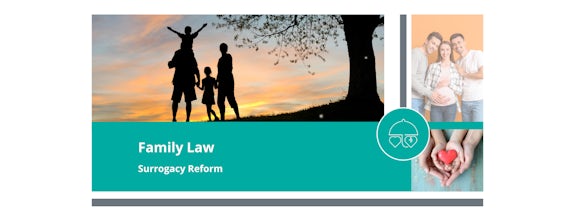
By Sarah Feeney
April 10, 2025

The Law Commission of England and Wales and the Scottish Law Commission published their eagerly awaited final joint report and draft bill on 29 March 2023.
Currently, the surrogate and, if applicable, her spouse/civil partner are the legal parents of the child at birth. Intended parents of children born through surrogacy must apply for a parental order to secure their legal parentage and extinguish the rights of the surrogate and any spouse or civil partner. This is a post birth process and can take several months to conclude and during this stage, the child is often in a state of legal limbo where they are living with their intended parents but who are not legally recognised as the child’s parents.
In the last ten years, surrogacy (in particular international surrogacy) has become increasingly popular as a means for people otherwise unable to conceive a child, to have a child that will be genetically related to at least one of them.
Current UK law on surrogacy makes it much more challenging for surrogacy to take place in the UK. . Relatively few parental orders are granted by the courts in Scotland. In 2021, for example, only 15 parental orders were granted. Surrogacy arrangements are unenforceable in the UK which means that a surrogate mother cannot be forced to give the baby to the intended parents after birth although in reality there have only been a handful of cases where this issue has arisen.- surrogacy in the UK is an altruistic framework and is based on trust between the surrogate and the intended parents where no payments other than reimbursement of reasonable expenses can be made.
Many people, understandably, feel existing surrogacy law in the UK is outdated and does not reflect modern family life. In today’s society families come in all shapes, sizes and dynamics and so will the proposed reforms provide clarity, safeguards and support for all involved in the process?
There are a number of important proposed reforms to the existing surrogacy laws which are set out below.
Those undertaking surrogacy in the UK will use a new pathway which will be administered by Regulated Surrogacy Organisations and regulated by the HFEA Subject to various eligibility conditions being met, intended parents will have legal parenthood from birth without the need to apply for a parental order.
There will also be a variety of pre-conception steps which include medical and enhanced criminal record checks, independent legal advice, implications counselling and a Regulated Surrogacy Statement signed by all parties and a Regulated Surrogacy Organisation.
This pathway will only be available where the surrogate consents.
While the pre-conception screening and safeguarding checks should mean that surrogacy agreements rarely break down, the surrogate will have the right to withdraw her consent to the surrogacy agreement, from the point of conception until six weeks after the birth of the child.
If the surrogate withdraws her consent before the child is born the intended parents must apply for a parental order if they wish to gain legal parental status instead of the surrogate
If the surrogate withdraws consent after the child is born the Surrogate must apply for a parental order if she wishes to gain legal parental status instead of the intended parents.
Where a parental order is still required for example where the surrogate withdraws her consent pre-birth or in the case of an international surrogacy arrangement it will largely remain the same process. The main change will be that the court will be able to dispense with the surrogates consent to a parental order being made in circumstances where the welfare of the child necessitates it.
It is recommended that Regulated Surrogacy Organisations (RSO’s) are created to support all parties to the surrogacy arrangement and these RSO’s will be regulated by the Human Fertilisation and Embryology Authority (HFEA). RSO’s will have duties to keep records that relate to surrogacy agreements on the newly proposed pathway and will have a duty to transfer these records to the HFEA within 12 weeks of the birth of a child. this information will be added to a new Surrogacy Register which surrogate born people will be able to access
The types of payment that can be made have been specified and will be the same whether the new pathway or a parental order application is being used so that there is a consistent approach. On the new pathway it is however recommended that intended parents should be required to meet certain costs such as life insurance and critical illness cover and the costs of meeting the screening and safeguarding requirements, unless the surrogate wishes to do so herself.
Other permitted categories of payments include:
– Modest gifts
– Costs of domestic support
-Pregnancy related items
– Travel/accommodation linked to the surrogacy arrangement
– a modest recuperative holiday
– loss of earnings
– Medical costs
Compensatory payments and general living expenses are prohibited. With the exception of the costs of a recuperative holiday the surrogate can recover unpaid agreed payments from the intended parents.
It is recommended that intended parents be entitled to improved employment rights including the right to receive a benefit equivalent to Maternity Allowance and improved rights to take time off work to attend ante-natal appointments.
It is recommended that international surrogacy arrangements are excluded from the new pathway so a parental order will still be required.
Recommendations have been made to speed up the time it takes to obtain a passport or visa for the child to address the current difficulties and delays faced by intended parents in being able to bring their child to the UK. it is recommended that the government should provide a single comprehensive guide for parents setting out the nationality and immigration consequences of having a child through an international surrogacy arrangement.
The proposed reforms are a step in the right direction for modernising surrogacy laws in the country, providing greater clarity and protection for all parties involved in surrogacy arrangements as well as a more accessible legal framework. It remains to be seen when and to what extent these proposed reforms will become law. The proposals certainly have the potential to make a positive impact on the lives of many intended parents and surrogates in the UK but only time will tell if the proposals actually go far enough to bring surrogacy law into the 21st century.
Gilson Gray has an expert team of solicitors who can help guide you through the surrogacy process.. If you would like further information regarding the topic discussed in this blog, please contact Sarah Feeney by email – sfeeney@gilsongray.co.uk or telephone 0141 530 2021
You can also visit our Family Law Team page for more information here.
The information and opinions contained this blog are for information only. They are not intended to constitute advice and should not be relied upon or considered as a replacement for advice. Before acting on any information contained in this blog, please seek solicitor’s advice from Gilson Gray.

Sarah is an Associate with Gilson Gray. She is accredited by the Law Society of Scotland as a mediator and is also a trained collaborative practitioner and is a member of Consensus. Sarah is a dedicated family lawyer and has specialised in family law since 2009.